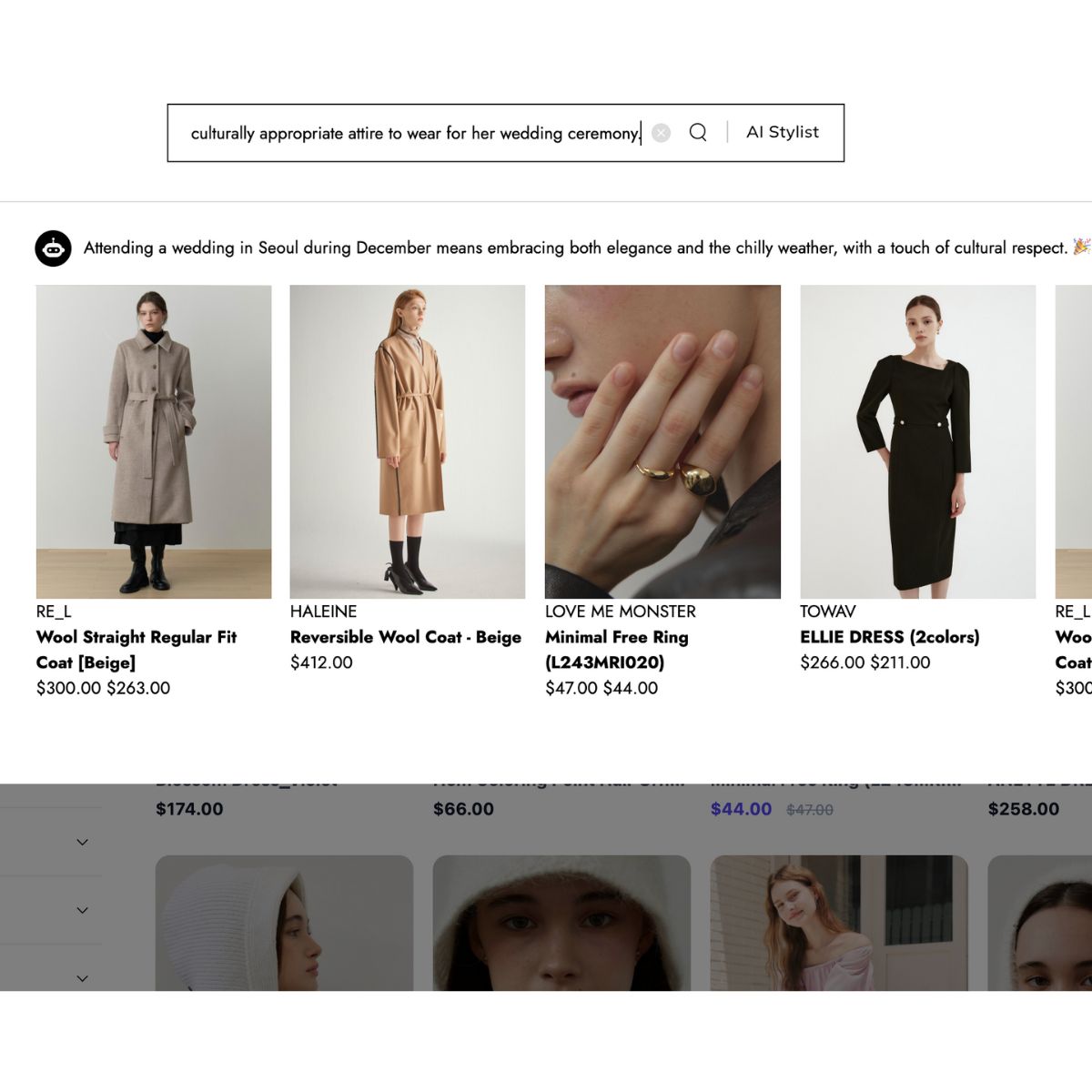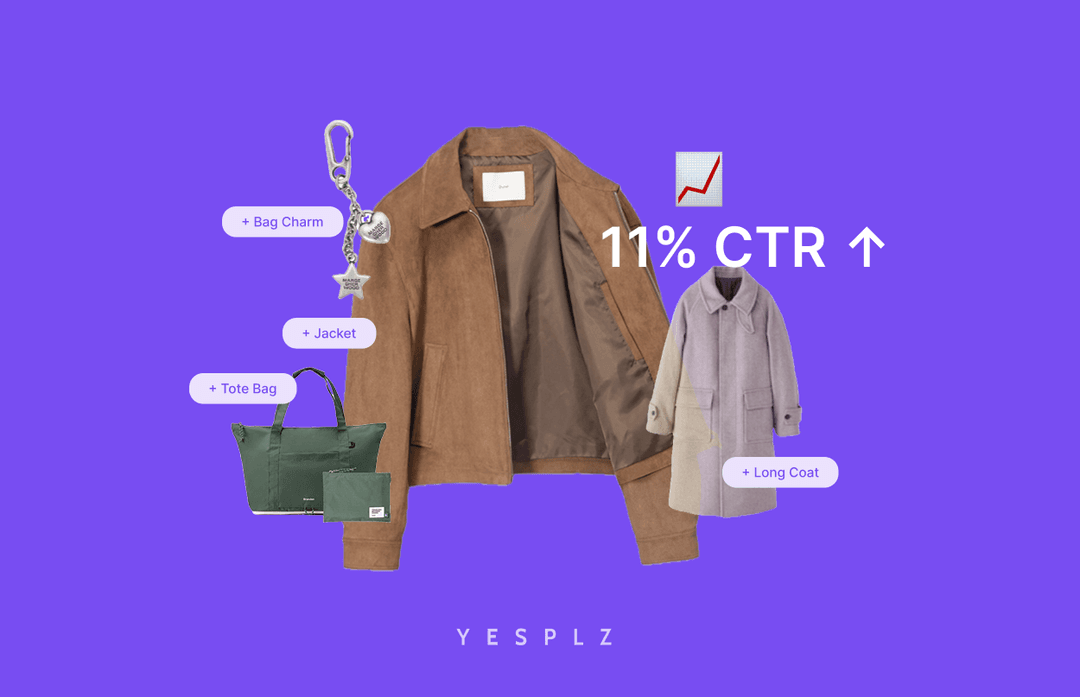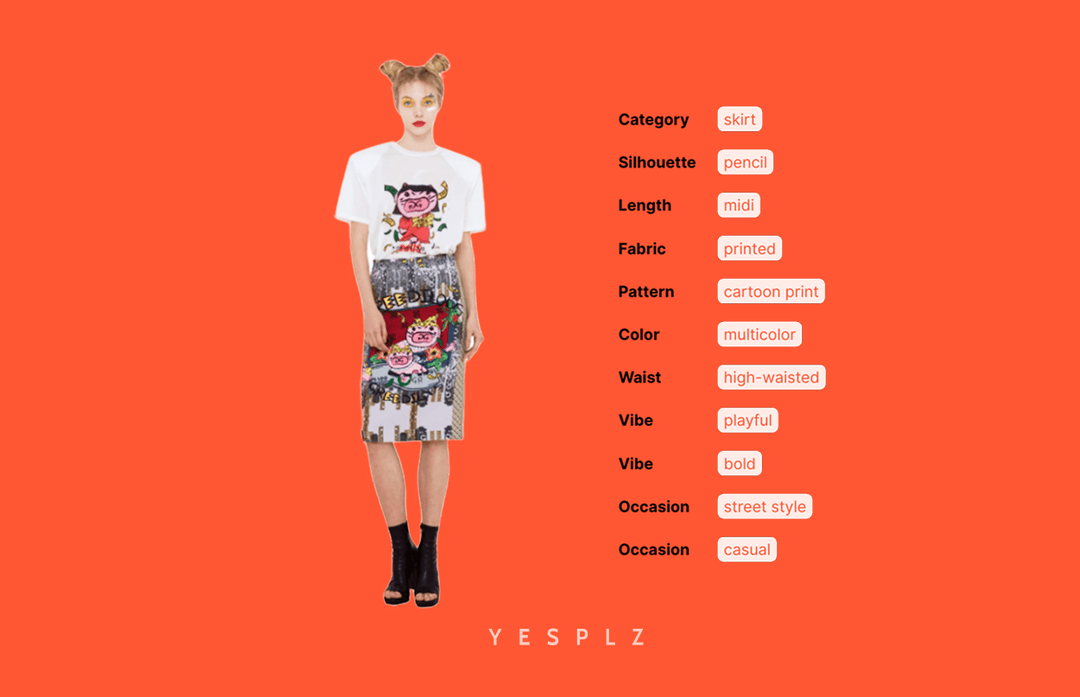Is your online fashion store ready for the upcoming year? Stay ahead in 2025 with this cutting edge eCommerce site search engine. The result is amazing.
by YesPlz.AIDecember 2024

A 2023 study reveals that 69% of online shoppers head straight to the search bar when landing on an eCommerce site. Yet, 80% of them leave due to a poor experience. And here’s the kicker: 99% of eCommerce pros still believe their search results are spot on. How is your fashion eCommerce site search engine doing?
Let’s do a quick test with two simple search queries.
First, try typing ‘shirts’ into your search bar. What do you get? A collection of shirts from different brands and styles? Or a mix of clothing items with only a few actual shirts?
This image shows the return result from one of the largest fashion retailers:
Next, let’s try another search query with ‘dress shirts.’ Does your site show formal shirts for men? Or are you seeing various types of dresses, as shown below:
If both queries miss the mark, chances are that online shoppers will leave your site right away. You’re likely missing out on potential sales opportunities.
But here’s the good news. You don’t have to settle for poor search results. The ultimate hybrid search can turn things around. It helps your online shoppers get smarter and more relevant search results.
Ready to give them the best search experience they deserve? Let’s dive into this eCommerce site search engine specifically designed for fashion.
YesPlz hybrid search utilizes AI models specifically trained for the fashion industry. As its name implies, it combines the best of many powerful search engines, including:
- Text Search
- Semantic Search
- Image Search
- Large Language Model (LLM) Search
Each of these has unique pros and cons. But together, they create a smarter and more flexible site search for fashion eCommerce. If one engine can’t find what shoppers search for, another will replace it to deliver the most accurate results. This teamwork lets hybrid search beat the limits of today's text-based eCommerce site search. Your online shoppers will always get relevant results for every query.
Curious about how the YesPlz AI hybrid search works? In this section, we’ll break it all down for you. You’ll see how this eCommerce site search engine works behind the scenes. You’ll also learn the pros and cons of each search engine type.
Text search relies on exact keyword matching to retrieve results. Picture this: Someone enters a query into your search bar. The text search engine doesn’t interpret the meaning or intent of the search term. It simply scans your product catalog and looks for literal matches in product information.
Let’s say someone types ‘white pants’ into your search bar. The text search engine will display all items containing the exact phrase ‘white pants” in their titles, descriptions, or tags. What if the same person searches for ‘white trousers?’ She might not see the same results or any results at all. Why? Because the phrase ‘white trousers’ might not exist anywhere in your product information.
Text search is the most traditional form of eCommerce site search engine. It remains widely used in eCommerce platforms today for its simplicity and speed. It is highly effective in some specific scenarios.
Finding Exact Keyword Matches
This search engine excels when search terms perfectly match product details. Let’s say, a shopper searches for ‘white pants.’ Text search quickly finds items that match the search term in your catalog.
Handling Precise, Straightforward Queries Effectively
When shoppers know exactly what they want, text search delivers fast and accurate results. For example, a specific product line like Nike Air Max. Or an exact SKU number such as SKU12345. These searches often yield instant success.
Correcting Typos and Handling Incomplete Queries
Text search includes basic features like spell-check, auto-correct, and auto-suggestion. These features help shoppers automatically fix typos or complete partial searches. For instance, turning ‘wite pants” seamlessly into ‘white pants.’
While text search is quick and simple, it often struggles with broad queries or fashion-specific context.
Vague or Broad Queries
What happens if people are still in the researching stage of their shopping journey? They don’t know what precisely they are looking for. So, they use generic terms to search. In these cases, this eCommerce site search engine often returns irrelevant results.
Look at picture 1 again. The ‘shirts’ query above is a typical example of these cases. Instead of showing shirts, the search result showcases a mix of hoodies, dresses, and other items. It appears that their titles, descriptions, or tags include the word ‘shirts’. So, the text search engine displays them without understanding the search intent and context.
Fashion-specific Intent or Context
As you can see, text search focuses solely on matching exact keywords. It doesn’t understand the search intent and context behind them. But in fashion, search intent and context matter a lot. They are decisive factors for a successful search query.
Let’s return to the ‘dress shirts’ query. Look at picture 2 again. The search result features various dresses instead of formal men’s shirts. Why does this happen? The text search engine probably can’t find the exact match for the phrase ‘dress shirts.’ So, it identifies the word ‘dress’ as a matching keyword. It then retrieves items containing ‘dress’ in titles, descriptions, or tags.
The text search engine often falls short of shoppers’ expectations. Relying on exact keyword matching makes many search queries unfulfilled. This is the major limitation of the current eCommerce site search engine.
Semantic search steps in to address this gap. Unlike text search, it interprets the meaning of the search terms. This capability allows it to return fashion items that match shoppers' intent. Whether the accurate search terms appear in product details doesn't matter.
Semantic search minimizes the weaknesses of text search. It focuses on comprehending what shoppers mean, not just the words they type. So, it better understands search intent and the context behind input words. This makes it especially effective at handling vague, broad, or descriptive queries.
Understanding Context and Meaning Behind Each Search Query
Semantic search understands synonyms, variations, and even related terms. A shopper searches for 'white trousers.' The semantic search engine interprets the phrase. It knows the shopper is looking for pants in white. In other words, it recognizes that ‘trousers’ and ‘pants’ refer to the same thing. Even if your product info only includes ‘white pants,’ the shopper still gets the same results. It doesn't matter if she searches for ‘white pants’ or ‘white trousers.’
Handling Vague, Descriptive, and Broad Queries Effectively
Semantic search understands the broader meaning behind a search term. Thus, it interprets shopper intent with greater precision. Let’s say, people type ‘Zaza upper garments’ into your search bar. The semantic search engine will showcase various kinds of tops from Zaza brands.
Despite its advantages, semantic search is not without drawbacks. It is inferior to text search in certain areas.
Less Precise for Exact Matches
Imagine this scenario: A shopper knows exactly what she is looking for. She doesn’t want to scroll down to see hundreds of items. So, she makes a search query with an extremely specific keyword. She expects to receive the results where the search terms appear exactly as input. In these cases, semantic search might not function well. It may return less relevant results due to its nature of detecting synonyms and comprehending broader meanings.
Higher Computational Demands
Another drawback of semantic search is that it needs more computational power. Unlike text search, this eCommerce site search engine goes beyond keyword matching. It looks at word relationships and deeper meanings. It uses advanced technologies like natural language process (NLP) and machine learning (ML.) As a result, the process becomes more complicated. Plus, the daily tasks of training and updating these algorithms consume enormous resources.
Image search is a game changer in eCommerce site search. Like semantic search, it leverages ML to grasp the meaning behind a search term. However, it has an added advantage. Going beyond just text - it can also process visuals. This ability makes it “feel” the vibe of a search query.
Image search isn’t limited to exact matches. It understands what shoppers mean, not just what they type. Therefore, it shares many benefits with semantic search.
Understanding the Context and Vibe of Search Queries
Suppose you are searching for ‘dress shirts.’ Image search doesn’t just look for the words ‘dress’ and ‘shirts.’ It looks at the entire concept to understand the style, material, occasion, and vibe. The results? It doesn't matter if the words “dress” or “shirts” are included in product info. You still receive spot-on results for items that matches the search query.
Handling Vague Queries
Image search can be your shopper's stylist. It happens very often when people don't know what to wear. In these cases, they might use broad or vague terms to search. Let’s say, someone searches for ‘comfortable shoes.’ image search scans your product catalog. Based on shoe patterns and features in the catalog, it showcases highly relevant options like lazy shoes or slip-ons.
Finding Similar Items
The key advantage of image search is its ability to find visually similar items. These items might not be the exact things shoppers are looking for. But they share the same style or feel. For instance, someone enters ‘blue sneakers’ into your search bar. image search can not only pull up sneakers in blue. But it also suggests sneakers in similar shades like teal or navy. This capability makes image search excel at product recommendations. It can suggest items shoppers may not have thought of but would still be interested in.
Image search shares many similarities with semantic search, including its drawbacks.
Not as Good with very Specific Searches
Like semantic search, it isn’t as precise with exact matches. If a shopper is super specific about their search, image search might miss the mark. Let’s say people find a model of a product like ‘Nike Air Max 90 red.’ Image search focuses more on concepts and similarities rather than exact matches. So, it might not always display exactly this model.
More Computational Power
This eCommerce site search engine analyzes text and visuals to understand the search vibe. Hence, it processes more complex data than text or semantic search. For this reason, it requires more sophisticated algorithms and computational resources.
Less Predictable Results
Image search is designed to prioritize concepts and similarities. Thus, it might sometimes show surprising results. For example, someone searches for ‘leather jackets.’ Image search might return a variety of jackets. These jackets don’t need to be the exact leather material. They can share a similar vibe, such as denim jackets. While this can inspire new choices, it might annoy shoppers who want something specific.
Large Language Model (LLM) search is the next big thing for site search technology. It represents a significant leap in leveraging AI to enhance shoppers’ search experience. In detail, it relies on advanced NLP to process every search more contextually and accurately.
LLM search is trained on extensive datasets. Thus, it excels at handling complex, multi-part queries. The results your shoppers get are more personalized and human-like.
Do you have any experience with something you know but aren't sure what it's called? So do your shoppers! They don’t know the exact keywords. So they will describe what they want in their natural language. This is where the LLM search shines.
Imagine someone asks your search bar: “I will attend my Korean friend's wedding in Seoul this December. Suggest weather-appropriate and culturally appropriate attire to wear for her wedding ceremony.”

In this scenario, text search, semantic search, or image search can’t function as well as LLM search. It can interpret full sentences, grasp context, and process intent. As a result, it will deliver the most accurate results.
In summary, LLM search is excellent at:
Understanding long and complicated queries
Handling natural language (conversational style, human-like style)
Delivering highly personalized results
LLM search shares the same drawbacks with semantic and image search. It is not efficient for exact search queries. Plus, training and running LLMs require significant computational power.
So now, you know the pros and cons of each search engine type. Each works well or not so well in different situations.
What if we could combine the best of them and minimize their weaknesses? That’s exactly what we do at YesPlz AI. We’ve spent many years perfecting hybrid search. This is the first innovative fashion search engine of its kind.
With hybrid search, fashion retailers don’t need to worry about updating product information. Forget about writing catchy titles, crafting engaging descriptions, and optimizing them for SEO daily. Our AI technology will take care of it all. Your shoppers can enter whatever they want into your search bar. Don’t need to stress about typos or try different search terms to get the expected results.
The secret sauce of YesPlz AI search lies in how it properly blends the most powerful search engines. Other hybrid search tools often fall short because they don’t strike the right balance. Consequently, it leads to inaccurate results.
We, at YesPlz AI, know how to get it right. Hence, it rewards your online fashion shoppers. They can find what they’re looking for with any keyword. Curious about how our fashion search engine works? Why not schedule a demo with us today?

Written by YesPlz.AI
We build the next gen visual search & recommendation for online fashion retailers

We analyzed 13,374 fashion searches. AI tagging increased product discovery by 22% and boosted clicks by 11%. Here’s what the data revealed.
by YesPlz.AI

Discover how YesPlz AI image tagging helps fashion retailers replace manual tagging with faster, more accurate, shopper-centric fashion attributes.
by YesPlz.AI